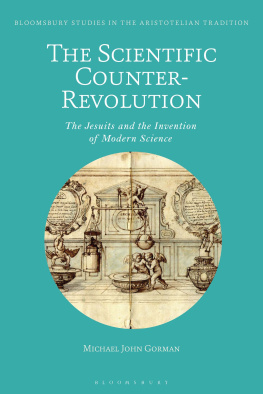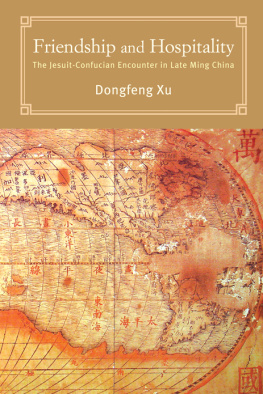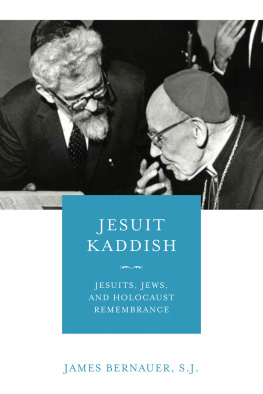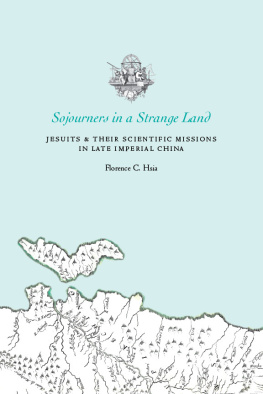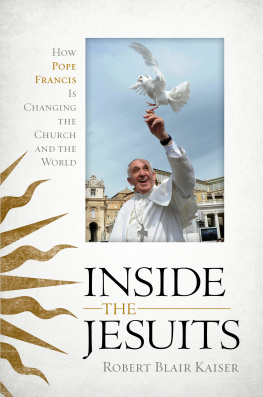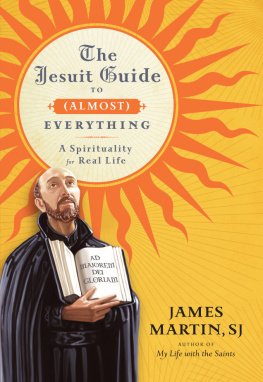
The Scientific Counter-Revolution
The Scientific Counter-Revolution
General Editor:
Marco Sgarbi, Universit Ca Foscari, Italy
Editorial Board:
Klaus Corcilius (University of California, Berkeley, USA); Daniel Garber (Princeton University, USA); Oliver Leaman (University of Kentucky, USA); Anna Marmodoro (University of Oxford, UK); Craig Martin (Oakland University, USA); Carlo Natali (Universit Ca Foscari, Italy); Riccardo Pozzo (Consiglio Nazionale delle Ricerche, Rome, Italy); Rene Raphael (University of California, Irvine, USA); Victor M. Salas (Sacred Heart Major Seminary, USA); Leen Spruit (Radboud University Nijmegen, The Netherlands).
Aristotles influence throughout the history of philosophical thought has been immense and in recent years the study of Aristotelian philosophy has enjoyed a revival. However, Aristotelianism remains an incredibly polysemous concept, encapsulating many, often conflicting, definitions. Bloomsbury Studies in the Aristotelian Tradition responds to this need to define Aristotelianism and give rise to a clear characterization.
Investigating the influence and reception of Aristotles thought from classical antiquity to contemporary philosophy from a wide range of perspectives, this series aims to reconstruct how philosophers have become acquainted with the tradition. The books in this series go beyond simply ascertaining that there are Aristotelian doctrines within the works of various thinkers in the history of philosophy, but seek to understand how they have received and elaborated Aristotles thought, developing concepts into ideas that have become independent of him.
Bloomsbury Studies in the Aristotelian Tradition promotes new approaches to Aristotelian philosophy and its history. Giving special attention to the use of interdisciplinary methods and insights, books in this series will appeal to scholars working in the fields of philosophy, history and cultural studies.
Available titles:
The Aftermath of Syllogism, edited by Marco Sgarbi, Matteo Cosci
A Political Philosophy of Conservatism, by Ferenc Hrcher
The Reception of Aristotles Poetics in the Italian Renaissance and Beyond, by Bryan Brazeau
Early Modern Aristotelianism and the Making of Philosophical Disciplines, by Danilo Facca
Phantasia in Aristotles Ethics, by Jakob Leth Fink
Virtue Ethics and Contemporary Aristotelianism, edited by Andrius Bielskis, Eleni Leontsini, Kelvin Knight

For my parents, Marianne and Michael Gorman
for Jesuits never content themselves with the Theory in anything, but straight proceed to practise
John Donne, Ignatius his conclave (1611)
It is amazing what you can accomplish if you do not care who gets the credit
Anonymous
Contents
The creation of this book has been a long and fascinating journey over more than two decades, during which I have accumulated many debts. I first became fascinated with Jesuit involvement in early modern science on reading Pietro Redondis book Galileo Heretic, and soon afterwards went to the European University Institute in Florence to work on my doctoral thesis, The Scientific Counter-Revolution: Mathematics, Experimentalism and Natural Philosophy in Jesuit Culture (1999) on which much of this book is based. I would like to thank my PhD supervisor, Dominique Julia, my external supervisor, Paolo Galluzzi and my doctoral jury members Mario Biagioli, John Brewer and Simon Schaffer (Jury Chair) for all their support and advice.
I was very fortunate to gain access to archives of the Pontifical Gregorian University in Rome thanks to the then archivist Fr Marcel Chappin, and worked extensively in Rome, mining those archives, Jesuit administrative archives (ARSI) and the rich libraries of that city. During this time, I also benefited greatly from an Erasmus at the cole des Hautes tudes en Sciences Sociales in Paris supported by Roger Chartier and then moved to London for a fellowship at the Warburg Institute. I then had the memorable experience of investigating Jesuit missionary science in Brazil, in Rio de Janeiro and Salvador da Bahia, thanks to Carlos Ziller-Camenietzki and the Museu de Astronomia e Cincias Afins (MAST). I was able to continue working on Jesuit natural philosophy and Athanasius Kirchers correspondence at the Dibner Institute in MIT, and then thanks to the support of Paula Findlen, at Stanford University, a veritable hotbed of Kircherians. It has been enjoyable, after several years of doing radically different things (perhaps somehow indirectly inspired by the transdisciplinary public exhibitions of seventeenth-century Jesuits), to blow off the dust, and look at this fascinating period through new eyes.
I would also like to thank the following people for their generous advice, suggestions and feedback along the long journey (in alphabetical order): Jean-Robert Armogathe, Ugo Baldini, Jim Bennett, Marco Beretta, Ann Blair, Pascal Brioist, Lawrence Brockliss, Massimo Bucciantini, Jed Buchwald, Charles Burnett, Filippo Camerota, Antonio Clericuzio, the late Alistair Crombie, Kirti Chaudhuri, Joseph Connors, Peter Dear, Sven Dupr, William Eamon, Mordechai Feingold, Joshua Foer, David Freedberg, Anthony Grafton, Michael Hunter, Michel-Pierre Lerner, Luce Giard, John Glassie, Susanna Gomez-Lopez, Steve J. Harris, Marcus Hellyer, Rob Iliffe, Jill Kraye, Christopher Ligota, Noel Malcolm, Aliocha Maldavsky, Alexander Marr, Massimo Mazzotti, Mara Miniati, Paul Nelles, Pietro Redondi, Daniel Roche, Guido Rebecchini, Eileen Reeves, Craig Rodine, Antonella Romano, Alain Sgonds, William R. Shea, Daniel Stolzenberg, Gerhard Strasser, Ren Taylor, Albert van Helden, Robert Westman and last, but certainly not least, Nick Wilding.
I owe a tremendous debt to the former archivist of the Pontifical Gregorian University, Fr. Marcel Chappin, SJ, for making the rich and relatively unexplored archives of that institution available to me and allowing Nick Wilding and me to digitize the Kircher correspondence and related materials. I am also deeply grateful to the archivists of the Jesuit archives in Rome, Fr Mario Zanardi, SJ, and Fr J. De Cock, SJ for their help with the archives. For extremely generous hospitality in Rome, Vienna, and Paris while conducting archival research, I thank (respectively) the Zaccagnini family, the late Georg and Alice Eisler and Desire Hayter. For help with photographic materials, I am grateful to Franca Principe and Elizabeth McGrath. I would also like to express my enormous gratitude to the staff of the cole Franaise de Rome, the Institute of Historical Research in London, the Warburg Institute, the Herzog August Bibliothek in Wolfenbttel and the Museo Galileo in Florence.
Stanford University Libraries deserve particular thanks, for assistance and permission to reproduce images from Kirchers works in their collections. Paula Findlen has played a key role in supporting research on seventeenth-century Jesuit culture, especially around Athanasius Kircher, in Stanford, through a host of publications, digital projects and conferences. I am also grateful to Paula and to Stanford Libraries for commissioning Caroline Bouguereau and me to recreate Athanasius Kirchers magnetic clock for their 2001 Kircher exhibition. Lawrence Weschler, David Wilson, Joshua Foer and John Glassie have been a source of wonderfully stimulating and wide-ranging conversations about Kircher over the years. I am very grateful to Marco Sgarbi for persuading me that it made sense to publish this as a book, and to Becky Holland and her colleagues at Bloomsbury for all their help. I thank my wife Lenka for her endless patience and encouragement, and my children Maia, Thaddeus and Benjamin for being a refreshing distraction from Jesuit machinations.
Next page
